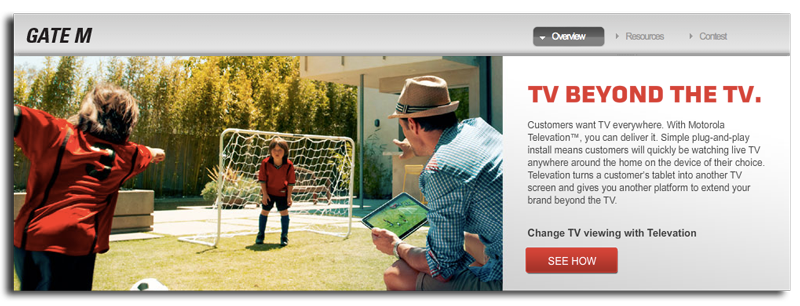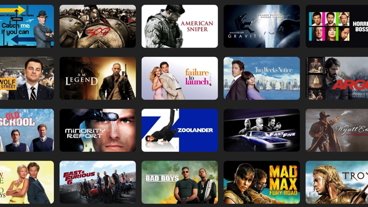Motorola purchase may bolster Google TV in bid to unseat Apple TV
Motorola Mobility's primary business is in creating smartphones, which it will continue to do under Google's ownership. And the search company will also control the more than 17,000 patents owned by Motorola.
But as part of the $12.5 billion acquisition announced on Monday, Google will also gain access to products and devices from Motorola that extend well beyond the mobile phone business. One key element of the deal, acknowledged by executives during a conference call, is Motorola's set-top box business, where the company builds high-definition digital video recorders and other devices.
Motorola's "Video Solutions" line of products also offer sharing of content. One product under that umbrella, "Televation," allows users to rebroadcast live TV to other devices in their home. In addition, Motorola also builds and sells "SURFboard" branded cable modems, Voice over IP telephony adapters, and other hardware.
"They're a leading home device maker, and that's also a big opportunity," Google CEO Larry Page said of Motorola on Monday. "We're working with them in the industry to really accelerate innovation."
Motorola's chief executive, Sanjay Jha, discussed a "great convergence" he sees happening in technology, where the mobile world, with devices like smartphones and tablets, is merging with set-top boxes, allowing users to seamlessly share content between devices.
Jha highlighted the "close relationship" that Motorola has established with carriers and cable providers as a potential asset Google might be able to leverage through its acquisition. He said together, Google and Motorola will be able to "accelerate convergence" in the market.
Executives made no specific mention of the struggling Google TV platform, but Motorola's existing presence in the set-top box market is a clear asset as Google attempts to enter the space. And their comments made clear that Motorola's TV-based hardware and established relationships with cable providers were a selling point in the multi-billion-dollar deal.
While the first generation of Google TV faltered, Apple has found moderate success, selling roughly a half-million units per quarter. But executives at Apple have famously referred to the Apple TV as a "hobby," because it is not in the same caliber of product as the iPhone, iPad, Mac or iPod.
Of course, Apple is already pushing the "convergence" touted by Google and Motorola executives with its own AirPlay technology, release late last year with iOS 4.2. The new Apple TV, powered by the same iOS mobile operating system as the iPhone and iPad, can receive audio and even high-definition video wirelessly from Apple's mobile devices, allowing content to be shown on the big screen.
 Sam Oliver
Sam Oliver














 Amber Neely
Amber Neely
 Thomas Sibilly
Thomas Sibilly
 AppleInsider Staff
AppleInsider Staff
 William Gallagher
William Gallagher
 Malcolm Owen
Malcolm Owen
 Christine McKee
Christine McKee









72 Comments
Ya know, Moo-gles market cap today is : 179.92B (and fairly high P/E of 20). Apples is 355.46B (15 P/E)
Apple... just buy'm and take'm out. Get it over with.
Motorola's set top box (STB) business will do nothing to stem Google's failure to launch Google TV, nor help against Apple TV.
Why? People don't buy STBs, corporations do. Corporations like Cox Cable and Comcast, who have their own content to peddle, and above all they don't need Google coming in trying to skim money (and viewers) off the top with Google TV bundled into their private-label STBs.
Interesting that your headlines pit everyone against Apple. Why Can't Google just realize an opportunity and go for it. When Apple brought forth smart phones, there were mobile phones available. Then they brought forth iPad, and created a new and exciting way to communicate better in a mobile way. Now everyone wants to beat Apple... at least according your headlines.
Wow
Um, GoogleTV and Motorola set-top boxes are so fundamentally different, it's not even funny. M-boxes are typically sold/rented by Cable companies to subscribers, to view/record cable subscriptions.
GoogleTV devices are (or were?) sold directly to consumers, specifically to AVOID cable subscriptions. It enabled users to view TV and movie shows without paying [or perhaps paying netflix and the like for movies].
The TV distribution companies decided to prevent GoogleTV from displaying their shows easily, and now all those GoogleTV devices are useless for their primary goal [of viewing TV for free].
Apple's device is more successful because it enables content producers to get paid [both TV and movie content] while making it easy for consumers to access what they want [except for various producers that intent on remaining in the DVD world, screw the internet].
Yes Motorola makes a lot of CATV boxes for the cablecos.
and the last thing the cablecos are going to do is let Google eat their lunch by cutting into their PPV and ad action via those boxes by packaging Google whatever into them. that ain't gonna happen.
Google TV's problem isn't the box anyway, it's the concept that "search" is what consumers want to do on their TV. it's not. they don't. they just want the content they want with as little effort and at as low a price as posssible. but searching for stuff is work.
Apple TV is much simpler. with iOS 5 whatever you can see/hear/do on your iPad you can put on your TV screen too. no stupid on-screen UI to fuss with. no clunky remote control (did you see that horrible Sony remote for Google TV?). now that's slick. using an iPad sitting on your sofa is fun already, not work. even when you really are searching for something. press the AirPlay button on the iPad and presto! there it is on your TV.
and for no extra charge. with no additional ads. and no mining of your personal data.